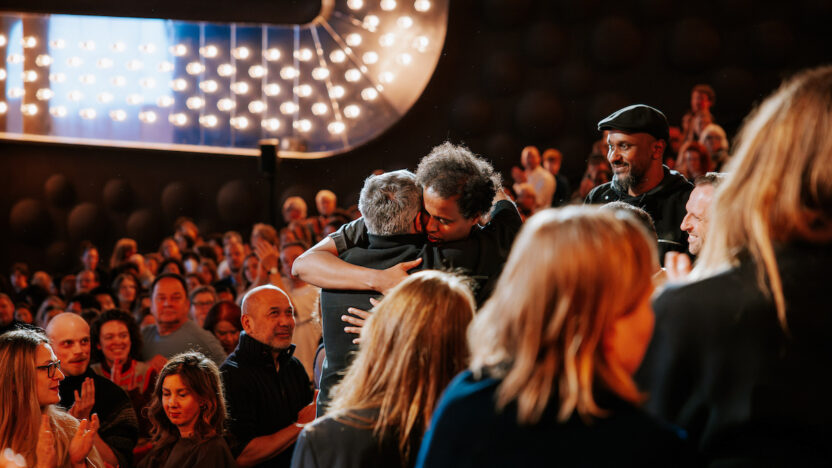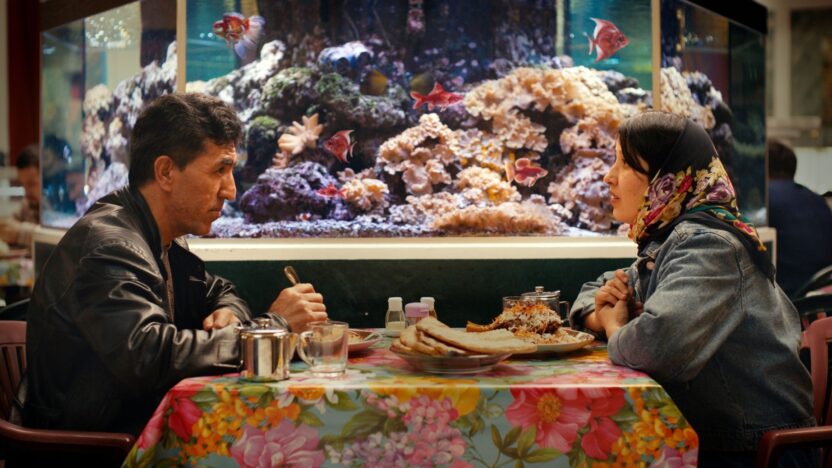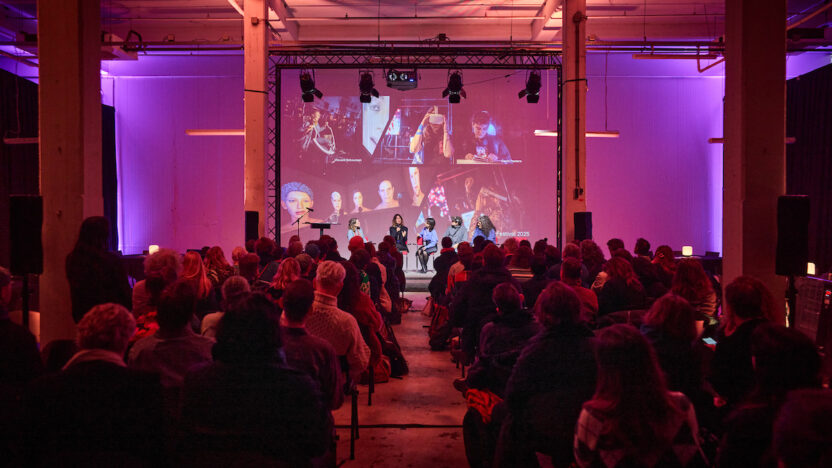Tiger and Big Screen award winners 2025
The winners of the top IFFR 2025 prizes are here! Alongside the Tiger Award and Big Screen Award, the Tiger Special Jury, FIPRESCI, NETPAC, and Youth Jury awards were announced during the ceremony in ‘de Doelen’.

Tiger Competition
IFFR’s trademark Tiger Competition celebrates the innovative and adventurous spirit of up-and-coming filmmakers. This is the festival’s platform for emerging film talent and featured a selection of 14 titles in the 2025 edition, each a world premiere. From the titles presented, the jury granted three prizes: the Tiger Award, worth €40,000, and two Special Jury Awards, worth €10,000 each.
The Tiger Competition Jury consisted of Yuki Aditya, Winnie Lau, Peter Strickland and Andrea Luka Zimmerman. The Jury also initially included Soheila Golestani (The Seed of the Sacred Fig), however she was unable to attend and thus participate due to a travel ban which prevented her leaving Iran.
Tiger Award
WINNER: Fiume o morte! dir. Igor Bezinović (Croatia, Italy, Slovenia)
The jury stated: “This is a film where people and public spaces are used as co-conspirators in exploring the past through the prism of contemporary Europe. At times of the rise of ultra-nationalism within a contemporary European context, the film playfully grapples with the past not as a closed chapter, but as a living reality. Unless we engage the past as a living present it will insist in ways that are not only a warning for the future, but threaten the very possibility of equitable co-existence and a life livable for not only those that have recourse to assert power. The film’s clash of staged reconstruction with real life refreshingly sheds light on the way history is continually present rather than preserved in aspic. While it is a playful and mischievous film, it presents a mirror to our present day.
Recourse to ultra nationalism, and even fascism, resides in the core of national identity, it is already inside of us as a form of knowledge we should be afraid to forget, and continuously need to process in order to forgo its grip. It is a reality we remember from movies, literature, billboards and books. These are memories that travel as far as the history of a nation. So we need to make history anew, again and again, to not only unforget, but beget the world we wish there was, for all of us.”
Special Jury Awards
WINNER: L’arbre de l’authenticité dir. Sammy Baloji (Democratic Republic of the Congo)
The jury stated: “A beautiful essay film with a methodical, playful and meditative approach to both science and history. Colonial worldviews provoke a gaze that questions the perspective of the viewer. Botanical science in this context was a colonial project and led to the extraction of resources for profit, which continues to this day around the world. The geopolitics is one facet of a film that also highlights the fact that the Congo basin’s jungle absorbs a huge amount of carbon. The rich earth and life in this place are not simply there for the plundering of resources. The root of the film’s discourse is in its portrayal of a 3,000-year-old tree that towers over human folly.”
WINNER: Im Haus meiner Eltern dir. Tim Ellrich (Germany)
The jury stated: “An intimately observed film. Judgement is done by the filmmaker not through measuring and imposing a certain morality but through social values and deep understanding. For a seemingly simple portrayal of family relations and ageing, it is deeply honest, emotionally fraught, and sensitively framed. Everything is on the surface, whether the film is trying to question individual choices or communal relations. Personal and collective agency is interrogated. Rather than employing satire, the film treats the characters with insightful complexity. While the composition and duration is measured with width and length, the yield of those emotional transactions are immeasurable and beyond a given price or physical existence. It is theatre after all, where the cruelty, the deceits, and the troubles are not concealed, but nurtured and proclaimed.”
Big Screen Competition
Bridging the gap between popular, classic, and arthouse cinema, the Big Screen Competition is dedicated to supporting the distribution of nominated films in the Netherlands. 14 titles were selected and each had their world premiere at IFFR 2025. The winning filmmaker(s) were awarded the Big Screen Award along with €15,000 in prize money. Additionally, IFFR offers €15,000 to the Dutch distributor that acquires the film’s distribution rights, incentivising local distribution.
The jury consisted of Bero Beyer, Dewi Reijs, Jia Zhao, Sara Rajaei, and Digna Sinke.
WINNER: Raptures dir. Jon Blåhed (Sweden, Finland)
The jury stated: “This year’s Big Screen Award goes to a film that explores themes of morality, family, resilience and dogma, a layered film that encapsulates a very local and perhaps little-known story in a profoundly universal theme. Driven by a complex leading role, the film is stunningly shot, literally composing its own language. A film that asks painful questions that were relevant almost a century ago and, as it turns out, are even more relevant today.”
FIPRESCI Award
A jury of international film journalists from the Fédération Internationale de la Presse Cinématographique awarded the FIPRESCI Award to their standout Tiger Competition title.
The jury consisted of Garance Hayat, Hossein Eidizadeh, Ossama Abdelfattah Rezk, Piotr Czerkawski, and Tim Lindemann.
WINNER: Fiume o morte! dir. Igor Bezinović (Croatia, Italy, Slovenia)
The jury stated: “We were impressed by the film’s playful use of archival footage and reenactment to shed light on a too-little-known episode of European history. Whilst full of dry, self-reflexive humour, the film manages to use its creative exploration of history to provide in-depth commentary on worrying contemporary political developments, specifically the rise of the global far-right. We applaud the film’s effortless combination of experimentation and accessibility – not least due to its excellent editing – which serves to convey a timely warning against the formation of authoritarianism.”
NETPAC Award
The NETPAC Award is awarded to the feature film from the Asia and Pacific regions by a jury from the Network for the Promotion of Asian Cinema. NETPAC’s mission is to highlight new talents, and as such the jury considers directors’ first and second features only, with European, International or World premiere status at IFFR. The film selected for this award must be from one of 71 eligible countries in Asia or the Pacific Nations and Islands to be considered.
The jury consisted of: Mevlut Akkaya, Rainbow Fong, and Rüdiger Tomczac.
WINNER: Bad Girl dir. Varsha Bharath (India)
The jury stated: “After watching 15 titles, making a decision was not easy. The film that we have chosen unfolds a coming-of-age story in a provocative way, it is cinematic and playful, with unexpected narrative solutions. The director employs a moody and vivid visual style to take us through the joys, worries, struggles and emotions of the character’s transformation.”
Youth Jury Award
The IFFR Youth Jury Award is selected by a panel of young people for an outstanding festival film of their choice. With the recognition of an aspiring jury of young film critics, the winner goes home with a prestigious award that puts them in the international spotlight.
WINNER: The Visual Feminist Manifesto dir. Farida Baqi (Syria, Lebanon, Germany, Sweden, Netherlands)
The jury stated: “The Visual Feminist Manifesto is a daring portrait of what it means to be a woman in today’s world and it delivers a crucial message we feel needs to be shared right now. Through the alluring static shots with the poignant close-ups of our main character, Farida Baqi develops a distinct, vulnerable way of filmmaking. From the first instance, the film proves itself to be one of a kind: unraveling its story in the format of a poem, it gracefully takes its viewer along. As the story unfolds, Baqi explores multiple unique aspects of womanhood through chapters, like the societal norms placed on women and the pressure that comes with that. Baqi doesn’t only focus on the negatives, but paints a clear, full picture of womanhood, making sure not to disregard the beauty of it and the delicate way a young woman views love and romance. We believe this film is cut out for evoking empathy and understanding among male viewers and really everyone in the world, invoking a sense of rebellion in the female populace and embracing the beauty of sisterhood.”
A list with articles
-

IFFR closes its 55th edition celebrating an uptick in new, younger audiences and industry attendees
Published on:-
News
-
Press release
-
-

Shahrbanoo Sadat’s No Good Men opens Berlinale 2026 among strong HBF and CineMart lineup
Published on:-
CineMart
-
Hubert Bals Fund
-
IFFR Pro
-
-

